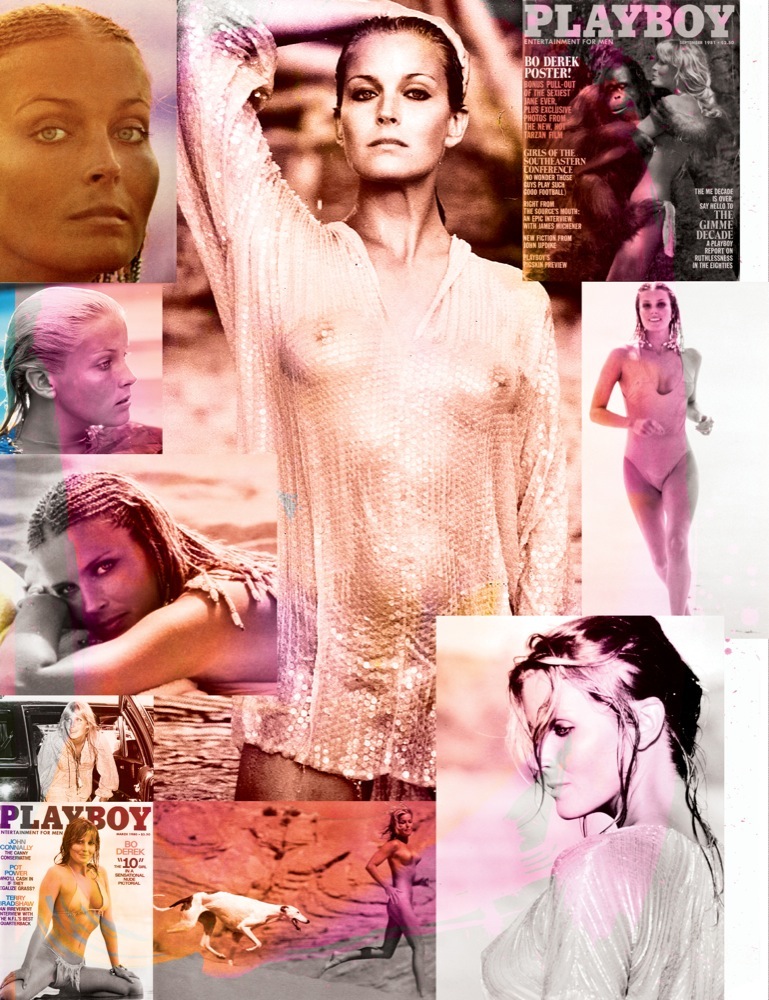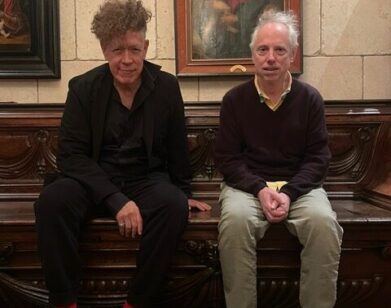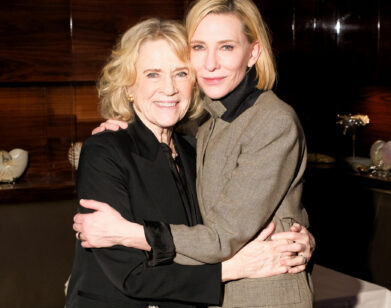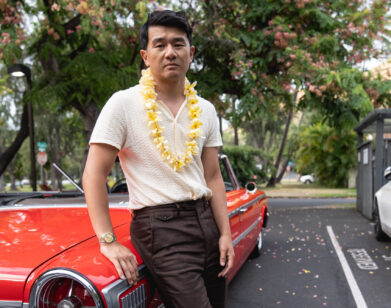Bo Derek
It was 37 years ago, but the moment still looms over Bo Derek’s life. You know the one: Derek, 22, is running along the beach wearing a skin-colored bathing suit and sporting cornrows. She is perfectly tanned, impossibly sexy, a goddess incarnate—a perfect 10. The sequence, which ran only a minute in Blake Edwards’s 1979 blockbuster, 10, endures long after the film has faded from our cultural consciousness. It’s the only thing most people even remember about the movie, which, for the record, is about a man who nearly destroys his life in pursuit of Derek’s dream girl, whom he barely knows. Although she’s the focus of the entire plot, Derek’s character hardly speaks until toward the end of the film; like all dream girls, she is more symbol than flesh-and-blood person.
In a sense, that has always been how Derek has been seen. Born Mary Cathleen Collins in Long Beach, California, in 1959, Derek now says she just sort of made up the name Bo around the time she met her husband, the director John Derek, when he cast the actress, then 16, in his movie Fantasies. Despite the fact that John was 30 years her senior and married to actress Linda Evans at the time, director and ingénue fell in love while filming in Greece. Bo dropped out of high school so she could remain in Europe with him and avoid statutory rape laws, and John and Evans divorced. When Bo was 18, she and John returned to California, and were married in 1976. They remained together until his death in 1998.
It was John who suggested Bo wear the now famous cornrows in her hair in 10—though his subsequent suggestions seem to have been less successful; John went on to direct Bo in Tarzan, the Ape Man (1981), Bolero (1984), and Ghosts Can’t Do It (1990). Throughout their life together, the press dubbed John a Svengali, but Bo insists she’s the one responsible for the triumphs—and the missteps—in her life: She says now that she never wanted to be someone’s puppet, nor is she all that perfect—which, as it turns out, is a lot more interesting.
HAYLEY PHELAN: Hi, Bo. Where are you?
BO DEREK: I’m in Ventura. Normally we’re [Derek and her longtime partner, the actor John Corbett] in Santa Ynez, near Santa Barbara, but we just got a little house on the harbor. It’s beautiful. We literally got it a few weeks ago, so we’re busy. But I’m looking out at the water; it’s just beautiful.
PHELAN: You’ve always been very active, right? So is it nice to be on the water?
DEREK: It is. I feel so fortunate. I was brought up along the beaches in Southern California, and then got to have horses. And now we’ve just got this vacation house and we have boats, so hopefully I’ll be sailing pretty soon.
PHELAN: Your dad worked for Hobie Cat, right? The sailing company.
DEREK: Exactly! So I’m looking for a new Hobie Cat.
PHELAN: Did you grow up sailing?
DEREK: I did. Sailing, surfing. My father actually lived next door to Hobie Alter [creator of the Hobie catamarans]. So growing up, we had prototypes and experimental things that we could play with; it was just fabulous. I actually bought my first surfboard in junior high. I saved my money.
PHELAN: Do you remember what board you got?
DEREK: Yeah, it was a Corky Carroll. He was this gnarly surfer.
PHELAN: You left high school, right, and spent a few months on the beach surfing and sunbathing?
DEREK: I did. I skipped school for a month straight. It was terrible; I got in big trouble. My mother was working a lot, so she was gone often. I would leave school and hitchhike to the beach. I can’t believe I hitchhiked now. It scares me to death now. I usually did it with girlfriends. I think I did it once alone. Never again. It wasn’t a good experience.
PHELAN: What happened?
DEREK: Just some creeps. They pulled over, and I got in and I learned. [laughs] I said, “You can let me out now,” and they did, which is good. It’s not their fault that they thought I wanted to have a little fun.
PHELAN: Do you think it was weirdly safer then, or do you think it’s the same?
DEREK: I think about that sometimes. I don’t think it was safer then, I really don’t. I think a high school girl hitchhiking is stupid. It was dangerous then and it’s dangerous now. I loved the adventure with my girlfriends. Probably because it was forbidden, and escaping the establishment was the big draw, feeling like the cool kids because we had skipped school, and we’d gotten to the beach, defying all the rules. But after a month, I was bored to death. All that freedom to do what I really wanted to do was so boring. I lost most of my friends in the process, because you spend all the time together sitting on the beach and you get bored. By the time I got caught, I was really looking forward to getting back to school.
PHELAN: How did you get caught?
DEREK: A truant officer showed up at my mom’s house. She had no idea I was skipping school, and she was furious. She was a working single mother, and she’d been getting up early in the mornings to drive me to the bus stop. And, to find out I didn’t get on the bus-I went around the corner and stuck out my thumb with my girlfriends-it was very disrespectful and selfish. Okay, I feel like shit now. [laughs]
PHELAN: Hey, you were 16. I think it would be weirder if that didn’t happen. So when you went back to school, did you and your mom patch things up?
DEREK: Yeah, and it was the first time I was going to school looking to learn. My whole experience of school prior was everything was being forced upon me. So it was the first time I was enjoying learning. And a few weeks later, I got the job to make a film in Greece. So I left school.
PHELAN: How did that happen?
DEREK: I went in and met with John Derek. And he said that there’s this movie, and he offered it to me. And he said the only problem is you’d have to leave school and go to Greece. It took me about two seconds to make that decision. And my mom was very cool. She came along as my chaperone, on the gorgeous island of Mykonos, in the winter, so we were the only foreigners there. It was magical.
PHELAN: You were still 16 at that time?
DEREK: I turned 17 on the film. I was there from November to January. It was probably, like, 10 weeks. Back then, everything was single camera, so it took longer to make films, longer than it does today.
PHELAN: Is that how you met John?
DEREK: It is. I had an agent, and I got a call from him, and I took notes, and my mom said, “What was that?” I said, “I have an interview in a few days.” And she said, “Oh, who with?” And I said John Derek, and she said, “Oh, my God, John Derek. He’s so handsome.” She was a huge fan. I was like, “Who’s John Derek?” I had no idea. And when I walked in and met him in the office, I thought, “Oh, Mom was right. He is so handsome.” But he was also 30 years older. So I didn’t think of him in any other way than, “Oh, he’s so handsome.”
PHELAN: Did the romance blossom while you were filming in Mykonos?
DEREK: It did. My mom was around, so that was awkward. It was very strange. I feel terrible about it. John was married to Linda [Evans] at the time, whom I worshipped and adored, and who was so kind to me. And then, when all this happened, I was at least halfway responsible for some serious pain she went through. She’d been very gracious and kind … And I just saw her yesterday, funny enough. We were at a jewelry trunk show for charity. And she was just as fabulous and wonderful as ever. I always feel like shit when I’m around her. It’s just ingrained, years later. That will never change.
PHELAN: I think you might feel worse than she does.
DEREK: I was young, yes, but I’ve been thinking about it. I don’t know why I never put it together, being responsible for the breakup of their marriage, but the dots didn’t connect for a while. I just hate myself when I think about doing that. That’s the worst thing you can do. It was very complicated, and dramatic, obviously. Some people could say it was meant to be, though, because I was with him until he died. But that just sounds like an excuse to me. It’s still the wrong thing to do. I remember I was doing an interview with Oprah, and she asked about it. I said, “No, I don’t forgive myself for that.” And she said, “Oh, you have to.” And I said, “You go on and you live, but you don’t have to tell yourself you’re okay. Not ever.”
PHELAN: Can you look back fondly, at all, on some of those times? It sounds like a very romantic place and time to fall in love.
DEREK: Yes, and obviously I loved him. It was incredible. We lived in Europe a lot of the almost 25 years we were together. There were wonderful people. We saw the world. It was fabulous.
PHELAN: What were some of the things you learned from being around him?
DEREK: Everything except for maybe surfing and sailing. [laughs] I could teach him a few things about that. And I understand, for him, it must have been fun to show me the world. But it also turned out I’m not such a puppet, as everyone probably thought. He admired strong women, always did, so even though I was younger, the relationship wasn’t so one-sided as everyone probably thought.
PHELAN: Do you think that was the perception—that you were under his spell, his puppet?
DEREK: It’s been so long that I think most people don’t even remember. But at the time, definitely. I even called my company Svengali Inc., because that was just the label we wore for so long.
PHELAN: And you feel like that’s not true at all?
DEREK: No, it was what it was. It was great. Look, I’m happy and healthy, and all is good. We all survived it.
PHELAN: What was it like to move to Europe and be so far away from home at such a young age?
DEREK: I loved it. I missed my sisters and my brother, and my parents. But I went back and forth enough that I saw them. But we’re talking 1974; countries were still different from one another then. I’m grateful that I got to travel.
PHELAN: Do you have any specific memories you could share?
DEREK: I think the funniest one was in Switzerland. John and Ursula [Andress], his second wife … They remained very close, so when it looked like we were getting serious, he took me to Switzerland to see her. I was scared to death. And she is so spectacular, so funny. Bigger than life. Certain people just make you feel like an oaf—awkward and ungraceful and clumsy—and that’s how she made me feel. She didn’t mean to. We’ve actually become very close, and see each other all the time. But at the time, she was intimidating. We went by train to Bern, where she was living. And I remember she picked us up in a Mini Cooper and drove us around, and she had this big coat and all the hair and the eyelashes and everything.
PHELAN: What did your parents and family think of this?
DEREK: They were pretty upset. I was 17. I thought I knew it all; I thought I had it all together. But when I look back and see pictures of myself, I see why everyone got so upset. [laughs] I was close with my parents, still am—both my parents are still living. My family is very friendly and easy to be around. Not very complicated. I checked in a lot with them, came home often. And I guess they sensed that was I was not being abused.
PHELAN: Right. I read that one of the reasons you guys decided to stay in Europe was to avoid the statutory laws in the U.S.
DEREK: Yeah, the statutory rape law and the Mann Act. My parents were … not okay, but keeping an eye on me. Concerned, but dealing with it. But this agent I had at the time thought that John Derek was giving me a big scar. I was just a beach girl with no experience in anything. He threatened to bring charges, and in California, I guess you belong to the state; you don’t even belong to your parents. It’s an old Spanish law. It doesn’t require your parents to swear out a complaint; anybody can. We got news that he had done that, so we stayed in Europe until I was 18.
PHELAN: That seems like a really big decision to make when you’re that age.
DEREK: But you just go with it. “Do I go home and go back to school or stay here? We’re going to go to Venice next week. No, I think I’ll stay here and go to Venice.” I didn’t think things through very much, obviously. I was just having a great time with this fabulous man.
PHELAN: Do you ever wish that you had finished high school?
DEREK: No, no. I didn’t go to a school in a great neighborhood. I was bused. Funny enough, I worked with Habitat for Humanity some years ago, and it was very near where I went to school. I’m building and I’m thinking, “God, I could so easily be one of the people waiting to get into one of these homes.” It was just another affirmation of how fortunate I’ve been in life. I don’t think ahead, I don’t design, I don’t plan. And except for a few times in my life, I haven’t been terribly reckless, but to think where life has taken me … I am very lucky.
PHELAN: 10 has become such an iconic thing. What was it like, filming that movie?
DEREK: It was a time. Blake Edwards was, like, the most successful director of all time. Because I didn’t work my way up in the industry, I didn’t have that experience of having to take care of myself. I just walked into it. And I walked into working with this hugely successful filmmaker, who really took care of me. So it spoiled me. Now when I go to work, I had better be prepared. Nobody’s going to give me a second chance. I have to do it like a grown-up.
PHELAN: So did you show up at 10 and just wing it?
DEREK: Yeah. I had no experience. I had done the little film in Greece. But I may have benefited from not having bad habits. When you trust your director completely, then you can relax, be spontaneous, be malleable. I’d like to have some of that confidence back now. Work is much harder for me now. Nerves.
PHELAN: What direction were you given in that famous scene where you’re running on the beach?
DEREK: First of all, I hate to run. I never, ever run. And Blake was famous for reshoots. I shot it the first time in Mexico. We went back twice to Hawaii; I had to do that scene three times. “Run. Go back! Run again.” I knew he was doing it in slow motion. There were these commercials at the time … Was it Nice’n Easy? Some hair commercial where it was a man and a woman running toward each other in slow motion. I knew we were doing a takeoff on those, and when you know you’re going to be in slow motion, you run a little smoother.
PHELAN: Obviously, the hair and the bathing suit ended up being a big thing. Was that just a spur-of-the-moment decision to put you in a suit like that, or was that carefully considered?
DEREK: It was my husband’s idea, really. It was the tail end of the 1970s and everything was fluffy, and I’m blond, and … What are you going to do to look different? John had always thought that that would be a good look for me, just for photography—he’s a great photographer. And we tried it. And he said, “Why don’t you take these pictures into Blake and see if he’ll go for it. It would be really good for the part, so you don’t look ordinary.” That was my suit. And when it came time to pick out wardrobe, Blake asked if I wouldn’t mind using my own suit.
PHELAN: Did you have any idea that that scene would become such a sensation?
DEREK: No, absolutely not. I did see a screening—I remember Dyan Cannon was there and she laughed. She has the greatest laugh in the world. The first trailer we saw was during a Muhammad Ali prizefight. And the trailer started with that shot of me on the beach, and John looked at me and said, “Oh, you’re going to be a big star.” He said, “This is going to be a problem; it’s going to mess with our lives.” [laughs] He was right. He’d seen it so many times. He was born in Hollywood. His parents were an actor and a filmmaker from silent movies.
PHELAN: And obviously a big part of it was that you became a sex symbol. What was that like?
DEREK: I grew up on the beaches, and I always found it kind of funny that it’s considered decent if you cover three tiny spots with pieces of fabric. I always thought that was kind of silly. You could be as vulgar as you want, as long as three tiny spots were covered. There was a lot of hypocrisy in the way we looked at sexuality. And nudity, especially. Because I don’t think they’re necessarily intertwined. But, back then, it’s the part I played. Blake wrote a sensual character. I did whatever I could to portray that. I never took it seriously; it was a job I had to do. I had such a big target on my back after that. Everything the press was saying was so negative. But on the street, even strangers have always treated me with respect. Don’t forget I was spending a lot of time traveling internationally. And, believe me, the rest of the world doesn’t put that stigma on someone who’s attractive. Not at all. They either like you in a movie or they don’t like you. Don’t forget we came from Puritans escaping religion persecution. There’s still a lot of that around. And I always thought it was funny, a good Christian girl could go up and bump and grind and be vulgar on stage, but God forbid you should just take off your clothes—you crossed the line.
PHELAN: Do you think it’s gotten better or worse for women?
DEREK: It’s gotten better, for sure. Even sexually they’re empowered. Sometimes I think some of our pop icons can make us cringe a little with their sexuality, but at the same time, I think a lot of my girlfriends growing up gave themselves up to any boy who paid attention to them. I think young women now are a lot more particular. They pick and choose.
PHELAN: Did your stardom have an impact on your relationship?
DEREK: He had just been away from the spotlight long enough that we were starting to get some privacy. Then when I came along, he said our privacy was fucked, so we bought a place in the country. We stayed away as much as we could. But at the same time, it’s my nature to get as much good as I can out of any situation. And there was nothing like fame—it’s an international credit card that even the most important royal family doesn’t have. I found that whatever interested me in life, I could pretty much pick up the phone, call somebody, and all of a sudden be in the middle of it. Or be around someone I admire, open a door that money can’t buy. I just had dinner with Sylvia Earle last month, the great marine biologist. So again: Thank you, Blake. I go through life saying, “Thank you, Blake.” [laughs] Presidents do leave me speechless and tongue-tied.
PHELAN: How many have you met?
DEREK: Quite a few. But National Geographic and nature were what my family celebrated the most. Sundays, instead of going to church, we watched National Geographic as a family. So to get involved with wildlife conservation and these great groups, these people that you admire, it’s heady stuff for me.
PHELAN: Do you feel like you’re still learning? Do you have a new adventure?
DEREK: I’m sort of in flux right now; I have no new adventure. I’m sure one will come. I love horses. I spent seven years as a racing commissioner on a horse-racing board, which I just left. I’m on the board of an organization, WildAid, that does work in the Galapagos, so I get to go there often and get my sea fix. I was Special Envoy of the Secretary of State on Wildlife Trafficking Issues and traveled the world with international coalitions. I have a collection of business cards that just are astounding—trustee of the Kennedy Center. Racing commissioner. I have a badge: Commissioner Derek. [laughs] I travel a lot. A lot, a lot. I don’t have a single passport that doesn’t have extra pages on it. I’m getting to the place where I can sort of go through airports now and there’s no hysteria. I can go places alone even. But at the same time, if you get in trouble, you can find somebody in your age group who might recognize you. John Derek and I were getting hassled at a bank or airport or something once, and he said, “Hold on, let me go find somebody older.” [laughs] He’d be recognized and we’d get pushed through. I find myself doing the same thing now, going to find someone older.
HAYLEY PHELAN IS A NEW YORK-BASED WRITER.







